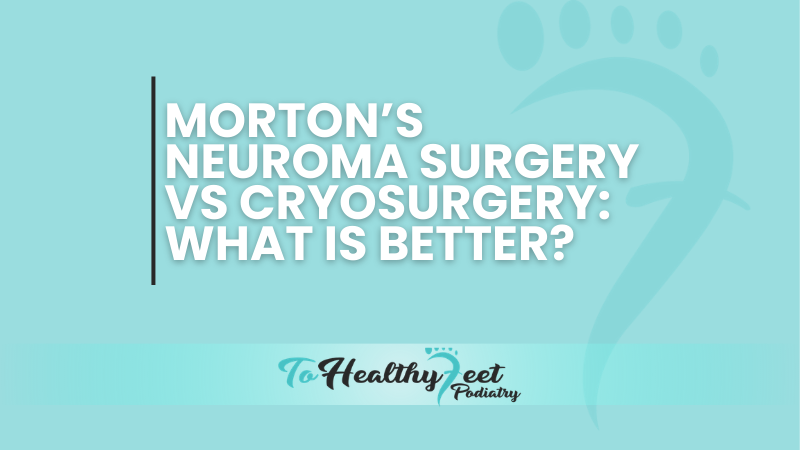What is Morton’s Neuroma?
Morton's Neuroma is a common condition that affects the nerves in the foot, typically in the ball of the foot, causing pain, numbness, tingling, and discomfort in the toes. It occurs when the tissue surrounding the nerves thickens, leading to compression and irritation of the nerve. Morton's neuroma is commonly associated with wearing tight or uncomfortable shoes, high-impact activities, and foot injuries. The condition is more common in women than men and typically affects people between the ages of 30 and 50. Treatment options range from conservative measures such as rest, ice, and physical therapy to more targeted treatments like steroid injections or cryosurgery.
Can I Qualify For Cryosurgery For Morton’s Neuroma?
There are several factors your podiatrist will take into consideration when determining if you are a candidate for cryosurgery.
Severity of Your Symptoms
The severity of your Morton's neuroma symptoms is an important factor to consider when deciding if cryosurgery is right for you. If your symptoms are mild to moderate, you may be able to manage them with conservative treatments such as rest, ice, compression, and physical therapy. However, if your symptoms are severe and affecting your quality of life, cryoneuroablation may be a good option to consider.
Location of Your Morton's Neuroma
The location of your Morton's neuroma is another important factor to consider. Cryosurgery is typically used to treat neuromas in the ball of the foot, which are located between the third and fourth toes. If your neuroma is located in a different part of the foot, cryoneuroablation may not be a good option for you.
Overall Health
Your overall health is an important consideration when deciding if cryosurgery is right for you. This procedure is minimally invasive and generally safe, but it does carry some risks, such as infection, nerve damage, and bleeding. If you have any underlying health conditions that could increase your risk of complications, such as diabetes or heart disease, your doctor may recommend alternative treatments.
Your Podiatrist's Recommendation
Ultimately, the decision to undergo cryoneuroablation for Morton's neuroma should be made in consultation with your foot doctor. Your podiatrist can help you determine if this procedure is right for you based on your symptoms, medical history, and overall health. They can also discuss the potential risks and benefits of the procedure and help you make an informed decision.
Cryosurgery For Morton’s Neuroma In NYC
Cryosurgery can be an effective treatment option for patients with severe Morton's neuroma symptoms. However, not all patients are good candidates for this procedure, and it should only be performed under the guidance of a qualified podiatrist with experience in diagnosing and treating Morton’s neuroma. If you are experiencing Morton's neuroma symptoms, speak to your doctor to determine the best course of treatment for your individual needs.
The team of foot doctors at To Healthy Feet in Manhattan can expertly assess all types of foot pain and discomfort and develop a personalized treatment strategy based on the severity of your symptoms, your lifestyle, and your goals for treatment. We provide accurate diagnosis and comprehensive foot and ankle care and have the tools and technologies necessary to provide a variety of tailored treatment approaches including custom orthotics, regenerative medicine, conservative interventions, and even minimally invasive surgery like cryosurgery for Morton’s neuroma(when needed) at each of our Manhattan Podiatry Clinics. If you are experiencing pain due to an ingrown toenail or any other foot or ankle condition pain, call To Healthy Feet Podiatry at 1-917-398-3668 or fill out the contact form to book your appointment at our Upper East Side, Times Square, Midtown Grand Central, or Downtown Manhattan locations today.
FAQ
Q: Does cryosurgery destroy the affected nerve?
A: No. The procedure merely destroys the thickened tissue that has formed around the nerve. The nerve itself is preserved and will regain full function and sensation after the recovery period.
Q: Does cryosurgery require any stitches?
A: No. The incision made by this minimally invasive procedure does not require any stitches.
Q: Will Morton’s neuroma come back after cryosurgery?
A: No, the neuroma will be destroyed, however, it is possible for new nerves to form and become irritated. Follow these tips to prevent Morton’s neuroma.




